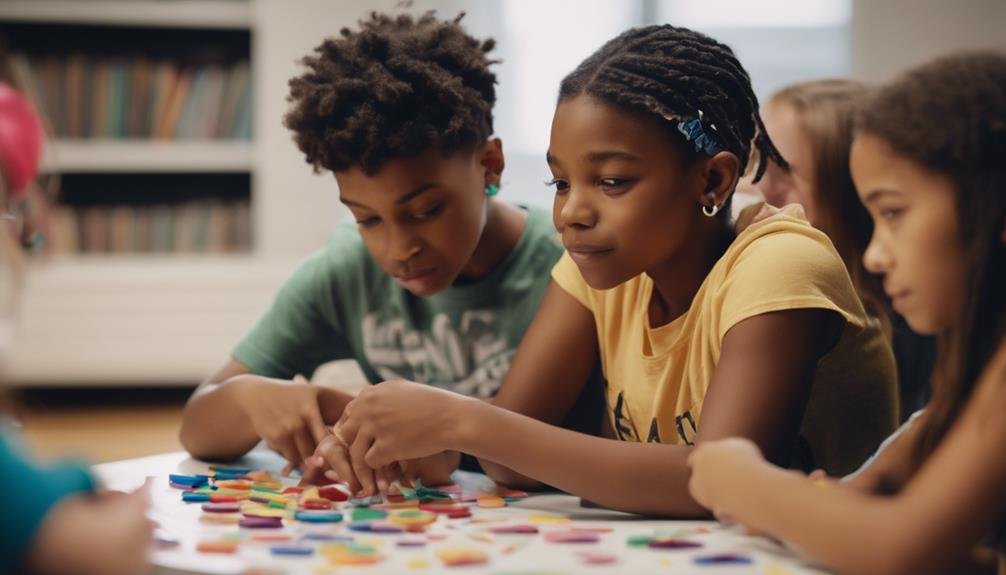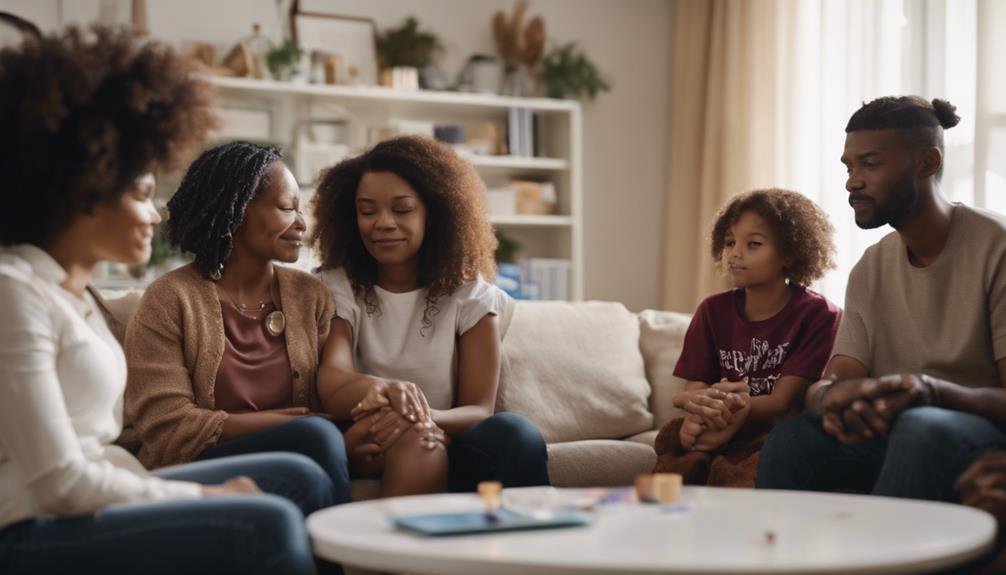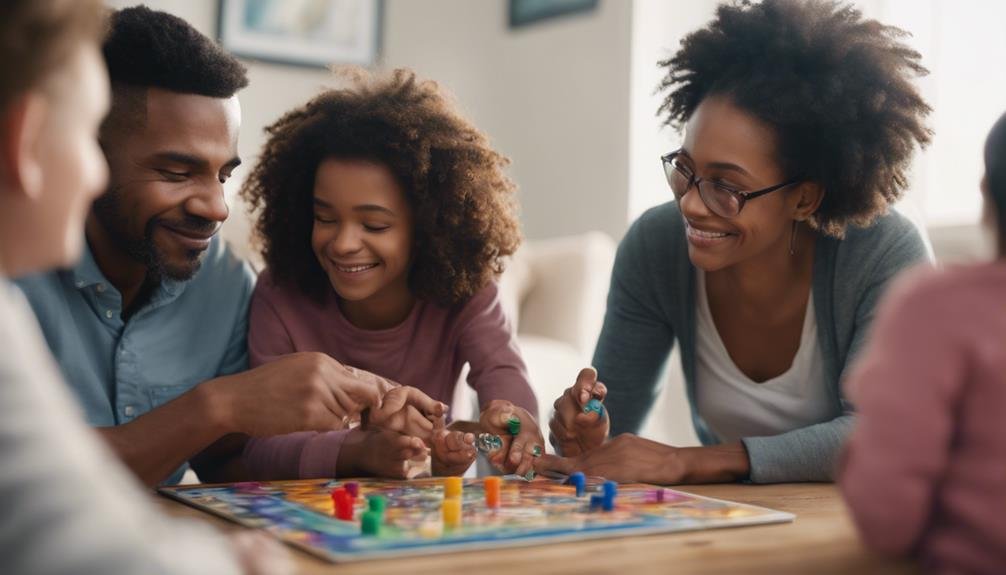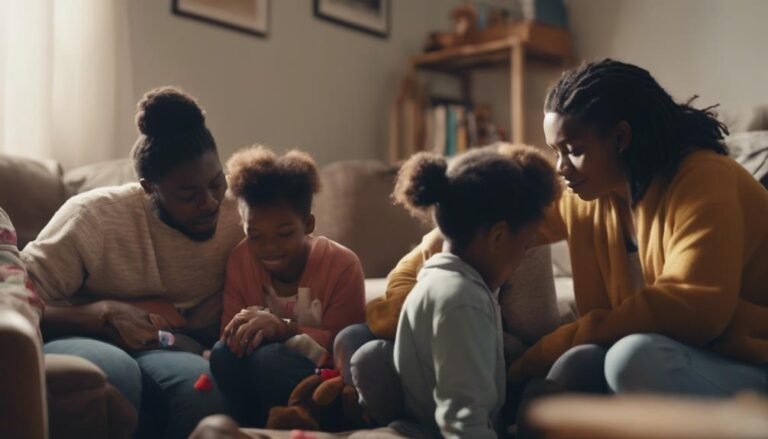To help families recover from domestic violence, focus on trauma-informed therapy to heal and understand past experiences. Build trust and communication skills through therapy sessions and support groups. Support children and teens with specialized therapy options like play and art therapy. Address intergenerational impact by recognizing trauma across generations. Promote resilience with family trauma therapy and community-based counseling programs. Empower survivors through therapy focusing on regaining control and building agency. Advocate for social change to prevent future abuse. A holistic approach encompassing these strategies is essential for healing and resilience within the family unit.
Key Takeaways
- Trauma-informed family therapy prioritizes healing and understanding.
- Building trust and communication skills through therapy and support groups.
- Providing specialized support for children and teens impacted by domestic violence.
- Utilizing resources and educational materials tailored to youth needs.
- Addressing intergenerational impact to break the cycle of abuse.
Trauma-Informed Family Therapy
In Trauma-Informed Family Therapy, healing and understanding are prioritized to create a safe environment for processing past traumatic experiences within the family, particularly those stemming from domestic situations. This type of therapy offers a compassionate approach to addressing the effects of domestic abuse and violence on family members. By delving into the complexities of these experiences, Trauma-Informed Family Therapy aims to rebuild trust, enhance communication, and equip individuals with healthy coping mechanisms.
For families impacted by domestic trauma, this therapy provides an essential opportunity to navigate through the pain and confusion in a supportive setting. It offers a pathway towards healing and growth, aiming to mitigate the long-term repercussions of domestic abuse.
Through group therapy sessions, the intergenerational effects of trauma, especially in cases of shared domestic violence experiences, can be effectively addressed. By fostering a space where individuals feel heard and validated, Trauma-Informed Family Therapy contributes to promoting emotional well-being and resilience within the family unit.
Building Trust and Communication Skills
You can start rebuilding trust and improving communication skills within your family by engaging in trust-building activities and practicing effective communication strategies.
Participating in support groups can provide a safe space for processing experiences and receiving empathy from others who understand what you’re going through.
Developing healthy communication skills through therapy is key to lessening the long-term effects of domestic abuse on your relationships.
Trust-Building Activities
How can trust-building activities aid families in recovering from domestic violence and developing essential communication skills?
Trust-building activities play an essential role in helping families impacted by domestic violence rebuild healthy relationships and communication patterns. By engaging in these activities, family members can work towards fostering trust, understanding, and empathy within the household. These exercises create a safe space for individuals to heal from past trauma and establish a foundation for growth. Through participating in trust-building activities, families can repair broken bonds and move forward towards a more positive and supportive environment.
Learning and practicing healthy communication skills through these activities is key to improving relationships and promoting emotional well-being.
Trust-building activities serve as an important step in the recovery process, guiding families away from the effects of domestic violence and towards a healthier, more harmonious future. By actively engaging in these exercises, families can cultivate trust, empathy, and effective communication, paving the way for healing and growth.
Effective Communication Strategies
Engaging in effective communication strategies is vital for rebuilding trust and enhancing communication skills within families recovering from domestic violence. Therapy sessions focused on communication can provide a safe space for family members to express themselves, listen actively, and work towards understanding each other’s perspectives.
By participating in these structured sessions, families can learn how to communicate effectively, set boundaries, and resolve conflicts in a healthy manner.
During therapy, individuals can develop skills such as active listening, assertiveness, and emotional regulation, which are essential for rebuilding relationships damaged by domestic violence. These sessions also offer a supportive environment where families can address underlying issues, express emotions, and practice empathy towards one another.
Support Group Participation
Participating in support groups is an essential step towards building trust and improving communication skills for families impacted by domestic violence. These groups offer victims of domestic violence a safe and supportive environment to share their experiences, feel understood, and work towards healing as a family unit.
By actively engaging in support groups, families can begin to rebuild trust, enhance communication, and address the trauma caused by domestic violence. The opportunity to connect with others who’ve gone through similar experiences can help lessen the long-term effects of abuse and promote emotional well-being for all family members involved.
Support group participation is a crucial component of the recovery process, providing individuals with a network of empathy, understanding, and encouragement as they commence on their journey towards healing from the impact of domestic violence. If you or your loved ones are affected by domestic violence, consider joining a support group to begin this healing process together.
Supporting Children and Teens

Supporting children and teens impacted by domestic violence is essential for their well-being.
Child therapy options, teen support groups, and educational resources can provide the necessary support for young survivors.
These resources aim to help children and teens cope with their experiences, heal from trauma, and rebuild their lives in a safe and nurturing environment.
Child Therapy Options
Child therapy options, including play therapy, art therapy, and cognitive behavioral therapy, provide essential support for children and teens impacted by domestic violence. These therapeutic approaches offer a safe space for young survivors to express their emotions, process trauma, and learn healthy coping mechanisms.
Through play therapy, children can communicate their feelings and experiences in a non-verbal way, promoting healing and emotional growth. Art therapy allows them to explore their creativity and articulate their inner struggles visually, aiding in emotional regulation and self-expression. Cognitive behavioral therapy equips children with practical skills to challenge negative thought patterns and develop positive behaviors.
Therapists specializing in trauma-informed care play a critical role in guiding children towards healing, resilience, and empowerment. By addressing the psychological impact of domestic violence early on, therapy helps prevent long-term emotional and behavioral issues. Providing child therapy tailored to their needs is essential in fostering a sense of safety, security, and well-being for young survivors as they navigate their path to recovery.
Teen Support Groups
Beginning the journey of recovery from domestic violence, teen support groups offer a nurturing environment for young individuals to connect, share, and heal. These groups provide a safe space where children and teens impacted by domestic violence can openly express their feelings and receive the emotional support they need.
By offering age-appropriate resources and activities, teen support groups help adolescents cope with the trauma they’ve experienced. The primary goal of these support groups is to empower youth to break free from the cycle of violence and develop healthy ways to handle their emotions.
Facilitated by trained professionals, teen support groups explore essential topics such as self-esteem, setting boundaries, and cultivating healthy relationships. Through these discussions, young individuals learn valuable skills that aid in their healing process.
Teen support groups play a crucial role in assisting adolescents in overcoming the effects of domestic violence and moving towards a brighter, more hopeful future.
Educational Resources for Youth
With a focus on providing essential support and information, educational resources for youth impacted by domestic violence play an important role in aiding their understanding and coping process.
These resources are designed to help children and teens comprehend and navigate the effects of domestic violence in a way that’s suitable for their age and developmental stage. Through programs that offer age-appropriate materials and activities, young individuals can gain knowledge and empowerment.
Additionally, support services often include counseling, peer support groups, and educational workshops tailored to the unique needs of children and teens. By addressing these specific needs, educational resources play a vital role in promoting healing and resilience among youth affected by domestic violence.
It’s important to make sure that these resources are widely accessible and utilized to provide the necessary support and guidance for young individuals experiencing such challenging circumstances.
Addressing Intergenerational Impact
Understanding the lasting effects of domestic violence across generations is a crucial step in breaking the cycle of abuse within families. Addressing intergenerational trauma is essential to recognizing how the experiences of violence can transcend from one generation to the next.
Children who witness or experience domestic violence are particularly vulnerable to this intergenerational impact, which can manifest in various ways throughout their lives. By acknowledging and addressing this impact, families can begin the healing process, fostering healthier relationships and preventing future instances of abuse.
Therapy and support services tailored to intergenerational trauma play an important role in helping families comprehend and overcome the effects of domestic violence. These resources provide a safe space for individuals to explore their experiences, learn coping mechanisms, and develop strategies to break free from the cycle of abuse.
Promoting Resilience and Well-Being

Promoting resilience and well-being after experiencing domestic violence involves actively engaging in specialized therapy and support services tailored to address the lasting impacts of trauma within families.
Family trauma therapy provides a safe space for processing experiences and nurturing empathy among family members. It aids in making sense of traumatic events and supports children and teens in their understanding and recovery journey, fostering emotional well-being.
Group trauma therapy plays a crucial role in addressing the intergenerational impact of domestic violence, facilitating healing across generations. Organizations like CAWC offer empowerment-based and trauma-informed therapy as part of their approach to domestic violence recovery, emphasizing the importance of emotional well-being in the healing process.
Supporting these initiatives involves reaching out through hotlines, volunteering, donating, and advocating for a life free of violence, contributing to the promotion of resilience and overall well-being in families affected by domestic violence.
Community-Based Counseling Programs
To support families recovering from domestic violence, community-based counseling programs like CAWC offer specialized trauma-informed therapy tailored to empower and educate survivors on their journey towards healing. These community-based programs focus on providing a safe and supportive environment where domestic violence survivors can rebuild trust, enhance communication skills, and learn healthy coping mechanisms. Through counseling sessions, families are guided in strengthening their bonds and managing the complex emotions that arise after experiencing trauma.
CAWC’s emphasis on empowerment and education not only aids individual survivors but also contributes to broader social change by working towards ending the cycle of violence. By participating in these community-based programs, families can access the resources and tools necessary to heal and move forward from the impacts of domestic violence.
Through a combination of therapeutic interventions and supportive services, these programs play an important role in helping families recover and thrive beyond their experiences of abuse.
Empowerment-Based Therapy Approaches

In empowerment-based therapy approaches, survivors of domestic violence are guided towards regaining control over their lives and rebuilding their sense of agency. These therapy methods prioritize your autonomy, choices, and strengths as you navigate the healing process.
Therapists utilizing empowerment-based therapy focus on helping you rebuild self-esteem and confidence following trauma. By emphasizing empowerment, you can develop coping skills and strategies necessary to break free from the cycle of abuse.
The ultimate goal of this therapy approach is to support you in reclaiming your sense of agency and moving towards a life free from violence. Remember, you aren’t alone in this journey towards empowerment and healing.
Therapists trained in empowerment-based therapy are here to provide you with the tools and support needed to navigate this challenging but transformative process. Your strength and resilience will guide you towards a future where you’re in control of your own narrative.
Advocacy for Social Change
As you seek ways to break free from the cycle of abuse, advocating for social change becomes an essential tool in preventing domestic violence and supporting survivors. Advocacy for social change involves promoting policies and practices that aim to address systemic issues contributing to family violence. By engaging in advocacy efforts, you play a crucial role in creating a society where all families can live free from abuse.
Through advocacy for social change, awareness is raised, attitudes are shifted, and protective measures are implemented to help end the cycle of domestic violence.
It’s through the collective efforts of individuals and organizations advocating for social change that real progress can be made in preventing domestic violence and supporting those who’ve experienced it.
Frequently Asked Questions
What Are Coping Mechanisms for Victims?
When facing domestic violence, seeking therapy and joining support groups can be key coping mechanisms. Connecting with others who understand your experiences in support groups can provide comfort, validation, and a sense of community.
Conclusion
As families recover from domestic violence, trauma-informed therapy, communication skills, and support for children are essential.
Did you know that over 10 million children witness domestic violence each year in the United States alone? Imagine the impact on their young minds.
By promoting resilience, empowerment, and advocating for social change, we can help families heal and create a brighter future for all.
Remember, you aren’t alone in this journey towards healing.







